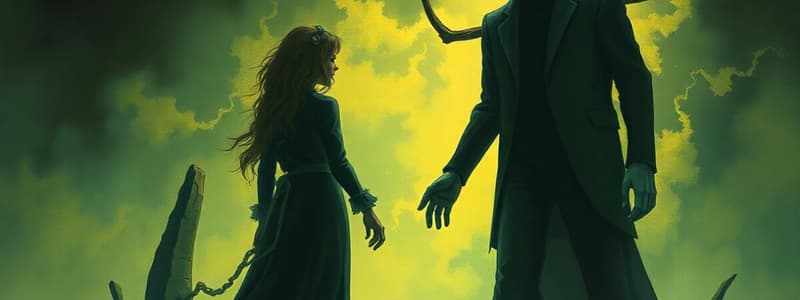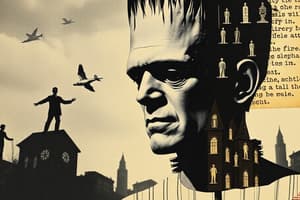Podcast
Questions and Answers
What emotions did the speaker primarily express during the night described in the passage?
What emotions did the speaker primarily express during the night described in the passage?
- Sadness and regret
- Rage and revenge (correct)
- Fear and anxiety
- Joy and contentment
What did the speaker compare himself to while wandering in the woods?
What did the speaker compare himself to while wandering in the woods?
- A peaceful spirit
- A lost child
- A lonely traveler
- A wild beast (correct)
What realization did the speaker come to regarding the conversation with the father of the cottage?
What realization did the speaker come to regarding the conversation with the father of the cottage?
- He should have acted more hastily
- It was a complete waste of time
- He had misunderstood the father's intentions (correct)
- The father would never accept him
How did the speaker feel about the relationship with mankind following his despair?
How did the speaker feel about the relationship with mankind following his despair?
What was the speaker's intended course of action after becoming fatigued from his exertion?
What was the speaker's intended course of action after becoming fatigued from his exertion?
What action did the protagonist take in response to feeling abandoned by the De Lacey family?
What action did the protagonist take in response to feeling abandoned by the De Lacey family?
How did the protagonist feel towards his creator after learning about his background?
How did the protagonist feel towards his creator after learning about his background?
What was the initial reaction of Felix upon discussing the cottage's future with a stranger?
What was the initial reaction of Felix upon discussing the cottage's future with a stranger?
What internal conflict beset the protagonist as he contemplated his situation?
What internal conflict beset the protagonist as he contemplated his situation?
Which geographical direction did the protagonist decide to travel to reach Geneva?
Which geographical direction did the protagonist decide to travel to reach Geneva?
What was the first act committed by the narrator towards the child?
What was the first act committed by the narrator towards the child?
What feeling did the portrait of the lovely woman evoke in the narrator?
What feeling did the portrait of the lovely woman evoke in the narrator?
What demand did the creature make of his creator?
What demand did the creature make of his creator?
How did the narrator respond to the creature's request?
How did the narrator respond to the creature's request?
What justification did the creature offer for his malice?
What justification did the creature offer for his malice?
What was the creature's perspective on the relationship between kindness and his behavior?
What was the creature's perspective on the relationship between kindness and his behavior?
What emotion dominated the creature's feelings towards his creator?
What emotion dominated the creature's feelings towards his creator?
What emotion primarily takes over the narrator as they continue their journey after injuring themselves?
What emotion primarily takes over the narrator as they continue their journey after injuring themselves?
What initial response does the child have upon seeing the narrator?
What initial response does the child have upon seeing the narrator?
What happens to the girl after the narrator saves her from drowning?
What happens to the girl after the narrator saves her from drowning?
Which natural phenomenon does the narrator describe experiencing while traveling?
Which natural phenomenon does the narrator describe experiencing while traveling?
How does the narrator feel towards mankind after their experience with the wound?
How does the narrator feel towards mankind after their experience with the wound?
What type of weather does the narrator encounter when reaching the boundaries of Switzerland?
What type of weather does the narrator encounter when reaching the boundaries of Switzerland?
What significant idea strikes the narrator when they see the child?
What significant idea strikes the narrator when they see the child?
What was the narrator's reaction to the natural beauty they encountered during their travel?
What was the narrator's reaction to the natural beauty they encountered during their travel?
Study Notes
The Monster's Plea
- The monster demands his creator to create a female companion for him, claiming it's a right.
- He argues that his misery stems from being alone and shunned by society, implying he'd be less malicious if he had someone to relate to.
- The monster vows to inspire fear if not love, particularly in his creator, highlighting his vow for revenge.
Frankenstein's Refusal
- Frankenstein refuses the monster's request, citing the potential for further desolation and wickedness.
- He calls the monster's request "base," emphasizing his moral stance against creating another being like him.
- He fears that two such beings could wreak havoc on the world, highlighting the potential for unchecked evil.
The Monster's Justification
- The monster argues that his actions are driven by his suffering, citing the lack of sympathy from humans and his creator.
- He compares himself to a victim, questioning why he should pity humans when they readily condemn and reject him.
- The monster claims he would bestow benefits upon those who are kind to him, implying a desire for connection and acceptance.
The Cycle of Revenge
- The monster threatens to seek revenge, vowing to destroy Frankenstein's heart and make him regret his creation.
- He states that he will not stop until Frankenstein is consumed by despair, highlighting the intensity of his anger and desire for retribution.
- The monster acknowledges his destructive passion is a consequence of Frankenstein's actions, laying the blame at his creator's feet.
The Creature's Plea
- The creature asks his creator to create a female companion for him, as hideous as himself.
- He promises to leave the world of humans and live in the wilds of South America with his companion.
- He claims that this companion will help him overcome his evil passions and find peace.
Victor's Hesitation and Consent
- Victor is initially hesitant to create a female companion, concerned about the consequences.
- He is moved by the creature's plea and recognizes a degree of justice in his request.
- Victor ultimately consents to the creature's request on the condition that he will leave Europe and never be seen again.
Victor's Internal Struggle
- Victor is conflicted by his feelings towards the creature, experiencing both compassion and horror.
- He grapples with the potential consequences of his actions, fearing the creature’s revenge.
- Victor’s fear is fueled by the creature’s potential for destruction and his ability to survive in harsh environments.
The Creation’s Perspective
- The creature seeks to create meaningful ties and connections.
- He believes that love and companionship will redeem him and suppress his darker impulses.
- He rejects the notion that he is inherently evil, arguing that his vices are the result of his loneliness.
The Consequences and Victor’s Resolution
- Victor's decision to create a companion leads to a profound sense of isolation and dread.
- His actions are consumed by a desperate desire to mitigate the potential harm of his creation.
- Victor resolves to dedicate himself to his “abhorred task,” driven by a sense of responsibility and love for his family.
Studying That Suits You
Use AI to generate personalized quizzes and flashcards to suit your learning preferences.
Description
Explore the intense dynamics between Frankenstein's monster and his creator in this quiz. Delve into the monster's arguments for companionship and Frankenstein's moral dilemmas regarding creation. Analyze the themes of isolation, revenge, and societal rejection that shape their relationship.




